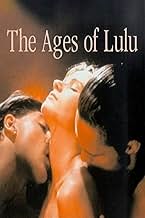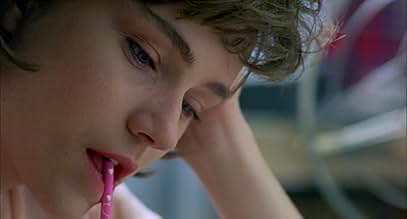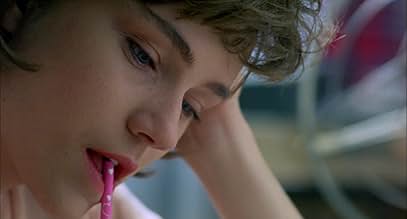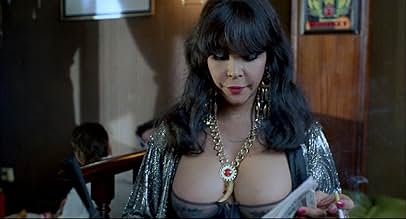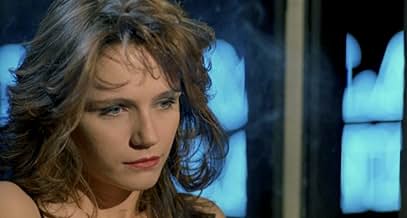NOTE IMDb
5,5/10
4,5 k
MA NOTE
À Madrid, l'histoire de la descente d'une jeune femme dans un milieu clandestin sexuel, vicieux et dangereux.À Madrid, l'histoire de la descente d'une jeune femme dans un milieu clandestin sexuel, vicieux et dangereux.À Madrid, l'histoire de la descente d'une jeune femme dans un milieu clandestin sexuel, vicieux et dangereux.
- Réalisation
- Scénario
- Casting principal
- Récompenses
- 2 victoires et 2 nominations au total
Óscar Ladoire
- Pablo
- (as Oscar Ladoire)
Gloria Rodriquez
- Cristina
- (as Gloria Rodríguez)
Àngel Jové
- Alicantino
- (as Angel Jové)
Luis Amposta
- Alcoy
- (as Lluís Amposta)
Avis à la une
This early (1990) major feature from Bigas Luna is the one which not surprisingly got him noticed. It is an uncompromising study of sexuality, exploring desires which most directors would shy away from on and probably off the camera. Italian actress Francesca Neri plays the lead character. It's an erotic, uninhibited performance, taking Lulu from an innocent virgin with a crush on her brother's friend to a woman so desperate for carnal gratification that she trawls bars looking for men with which to have three-way sex. For some, the film's frankness masturbation, homosexual sex and cunnilingus and exploration of everything from transsexual sex to incest might bring it close to pornography. But it is refreshing to see these challenging areas of sex dealt with by a competent director and good cast of actors. It hints at the themes which would run through Luna's later work, such as Jamon, Jamon and Golden Balls but without the quirky humour of those films. Slightly exhausting, perhaps taking on too much of the dark side of sexuality.
Bigas Luna's adaptation of Almudena Grandes' provocative novel arrives with visual flair but struggles to transform literary sensuality into compelling cinema. The film's atmosphere oscillates between Madrid's sun-drenched streets and shadowy underground spaces, creating a visual dichotomy that mirrors its protagonist's journey from innocence to experience. Luna's camera work captures intimate moments with a voyeuristic intensity, though the cinematography occasionally feels more calculated than organic, particularly during the film's more explicit sequences.
The cast delivers uneven performances across the board. Francesca Neri brings a magnetic presence to the titular Lulú, embodying both vulnerability and awakening desire with natural charisma. Her performance anchors the film's emotional core, even when the script veers into melodramatic territory. Óscar Ladoire as Pablo provides adequate support as the older lover who initiates Lulú's sexual awakening, though his portrayal lacks the complexity needed to make their relationship truly compelling. The supporting cast, including a young Javier Bardem in his film debut, offers glimpses of talent that would later flourish, but here serves more as atmospheric texture than substantial character development.
Luna's direction shows ambition in tackling themes of sexual liberation and self-discovery, yet the execution feels uneven. The film's pacing drags during certain sequences while rushing through others that deserve more contemplation. The explicit content, while integral to the story's exploration of female sexuality, sometimes feels gratuitous rather than genuinely revealing of character or theme. The movie's attempt to balance art house sensibilities with mainstream appeal results in a work that satisfies neither camp completely.
The production design effectively captures early 1990s Madrid, with locations ranging from bourgeois apartments to seedy nightclubs creating a believable world for Lulú's transformation. However, the film's exploration of dangerous sexual territory feels more sensationalist than psychologically truthful, undermining its pretensions toward serious drama about female empowerment and sexual agency.
The cast delivers uneven performances across the board. Francesca Neri brings a magnetic presence to the titular Lulú, embodying both vulnerability and awakening desire with natural charisma. Her performance anchors the film's emotional core, even when the script veers into melodramatic territory. Óscar Ladoire as Pablo provides adequate support as the older lover who initiates Lulú's sexual awakening, though his portrayal lacks the complexity needed to make their relationship truly compelling. The supporting cast, including a young Javier Bardem in his film debut, offers glimpses of talent that would later flourish, but here serves more as atmospheric texture than substantial character development.
Luna's direction shows ambition in tackling themes of sexual liberation and self-discovery, yet the execution feels uneven. The film's pacing drags during certain sequences while rushing through others that deserve more contemplation. The explicit content, while integral to the story's exploration of female sexuality, sometimes feels gratuitous rather than genuinely revealing of character or theme. The movie's attempt to balance art house sensibilities with mainstream appeal results in a work that satisfies neither camp completely.
The production design effectively captures early 1990s Madrid, with locations ranging from bourgeois apartments to seedy nightclubs creating a believable world for Lulú's transformation. However, the film's exploration of dangerous sexual territory feels more sensationalist than psychologically truthful, undermining its pretensions toward serious drama about female empowerment and sexual agency.
Boundaries are there to be broken ... or at least stretched. This movie right here does not take prisoners (pun intended). And it does not care about being sensitive. In some ways it might feel like cliche, but that does not mean it's an easy watch.
Contrary this is quite hard to watch and if you are squeamish almost near impossible. And while some may find certain things titilating (there's a lot of nudity here), others may take "offense" that there is also a lot of male nudity and themes they don't approve of (homosexuality, transsexuality, bisexuality and so forth). So whereever you come from, this movie does not care if you will be offended, it just does its thing.
And the losing of innocense (literally and metaphorically speaking) is quite a sight to behold. Like other things, sex can become an addiction and there's more here than just shock value. Creepy, violent and not compromising ...
Contrary this is quite hard to watch and if you are squeamish almost near impossible. And while some may find certain things titilating (there's a lot of nudity here), others may take "offense" that there is also a lot of male nudity and themes they don't approve of (homosexuality, transsexuality, bisexuality and so forth). So whereever you come from, this movie does not care if you will be offended, it just does its thing.
And the losing of innocense (literally and metaphorically speaking) is quite a sight to behold. Like other things, sex can become an addiction and there's more here than just shock value. Creepy, violent and not compromising ...
In Madrid, the teenager Lulu (Francesca Neri) has a crush on Pablo (Oscar Ladoire), who is the best friend of her brother Marcelo (Fernando Guillén Cuervo). One day, they go together to a concert and Lulu loses her virginity with Pablo. However, he travels to the United States and Lulu misses him.
When he returns, they meet each other and Pablo proposes Lulu to marry him. Soon they befriend the travesty Ely (María Barranco) and play sexual games with her. Later they have a daughter, Ines.
One day, after a party, Pablo blindfolds Lulu and proposes a threesome; when Lulu discovers that she had an incestuous relation with Marcelo, she leaves Pablo to live with Ines in an apartment. Lulu feels bored and soon she is addicted in kinky and bizarre sex with gays in the underground of Madrid. Her erotic journey descends to hell when she meets the dangerous Remy (Juan Graell) that invites her to the world of sadomasochism.
"Las Edades de Lulú" is a film by Bigas Luna immediately after the cult "Angustia" that discloses the erotic and dramatic journey of a Spanish woman to the underworld of the bizarre sex in Madrid. I saw this movie for the first time in the early 90's (last time was on 29 Aug 1999 on VHS), and today I have just seen it again on DVD and this film has not aged.
Francesca Neri is very beautiful and sexy and I did not recall that "Las Edades de Lulú" is the debut of Javier Bardem in a feature. I would like to highlight that this movie is sexually violent and perverted reaching the boundary with pornography and is only recommended for very specific audiences. My vote is seven.
Title (Brazil): "As Idades de Lulu" ("The Ages of Lulu")
When he returns, they meet each other and Pablo proposes Lulu to marry him. Soon they befriend the travesty Ely (María Barranco) and play sexual games with her. Later they have a daughter, Ines.
One day, after a party, Pablo blindfolds Lulu and proposes a threesome; when Lulu discovers that she had an incestuous relation with Marcelo, she leaves Pablo to live with Ines in an apartment. Lulu feels bored and soon she is addicted in kinky and bizarre sex with gays in the underground of Madrid. Her erotic journey descends to hell when she meets the dangerous Remy (Juan Graell) that invites her to the world of sadomasochism.
"Las Edades de Lulú" is a film by Bigas Luna immediately after the cult "Angustia" that discloses the erotic and dramatic journey of a Spanish woman to the underworld of the bizarre sex in Madrid. I saw this movie for the first time in the early 90's (last time was on 29 Aug 1999 on VHS), and today I have just seen it again on DVD and this film has not aged.
Francesca Neri is very beautiful and sexy and I did not recall that "Las Edades de Lulú" is the debut of Javier Bardem in a feature. I would like to highlight that this movie is sexually violent and perverted reaching the boundary with pornography and is only recommended for very specific audiences. My vote is seven.
Title (Brazil): "As Idades de Lulu" ("The Ages of Lulu")
As some films those has been a dime for cinephiles here another nugget to pin as favourite on the board. The actors very keenly learned acting and staged it with a good practice of reading. Yeah they nailed it.
I have been shocked and stunned by saw "Love (2015)" by Gaspar noe and thought he was the first to break the laws of film certifications but now I'm struct between the melodies and cinematography in this film. I even said to myself that "we found father of noe"
This must be one of the inspiration for Gaspar. It's obvious. And in 1990's period oh my god I couldn't think how mature the writers and the Director was.
Plus I donno why it got so low rating for a monumental modern script. Well if it would be screen now I'm solid this would reach every laptops on the movie lovers
I have been shocked and stunned by saw "Love (2015)" by Gaspar noe and thought he was the first to break the laws of film certifications but now I'm struct between the melodies and cinematography in this film. I even said to myself that "we found father of noe"
This must be one of the inspiration for Gaspar. It's obvious. And in 1990's period oh my god I couldn't think how mature the writers and the Director was.
Plus I donno why it got so low rating for a monumental modern script. Well if it would be screen now I'm solid this would reach every laptops on the movie lovers
Le saviez-vous
- AnecdotesFrancesca Neri was entirely dubbed by Natalia Dicenta.
- Versions alternativesThe UK video was cut by 2 minutes and 55 seconds by the BBFC to shorten the 'carrying' sex scene, the actor touching Lulu in a car, and the orgy scene at the gay club. These cuts were restored for the 2002 DVD but a shot of a female baby lying on her back with her vagina exposed to the camera was removed for the Protection of Children Act 1978. The cut to the opening credits was implemented by blanking the offending video of the child's baptism.
Meilleurs choix
Connectez-vous pour évaluer et suivre la liste de favoris afin de recevoir des recommandations personnalisées
- How long is The Ages of Lulu?Alimenté par Alexa
Détails
- Durée1 heure 35 minutes
- Couleur
- Mixage
- Rapport de forme
- 1.85 : 1
Contribuer à cette page
Suggérer une modification ou ajouter du contenu manquant

Lacune principale
By what name was Les vies de Loulou (1990) officially released in Canada in French?
Répondre
